Module 4 Unit 1 Will you take your kite 课件(共52张PPT)
文档属性
| 名称 | Module 4 Unit 1 Will you take your kite 课件(共52张PPT) |
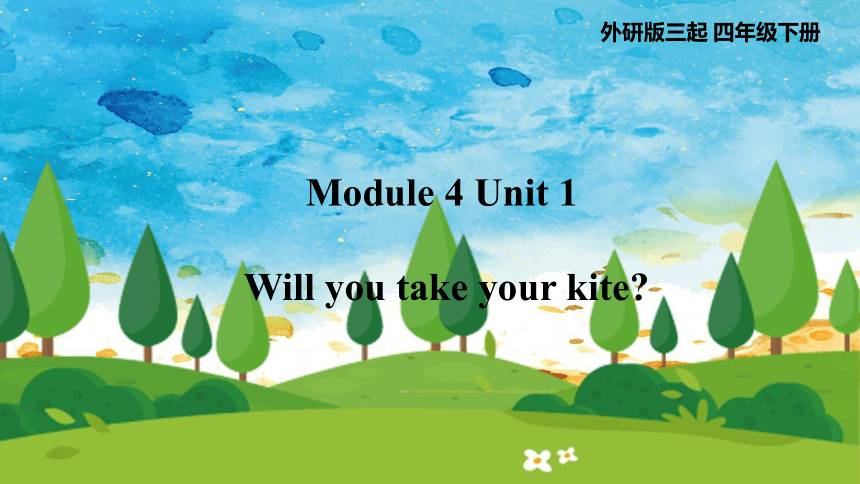
|
|
| 格式 | pptx | ||
| 文件大小 | 9.7MB | ||
| 资源类型 | 试卷 | ||
| 版本资源 | 外研版(三年级起点) | ||
| 科目 | 英语 | ||
| 更新时间 | 2024-03-16 16:47:33 | ||
图片预览

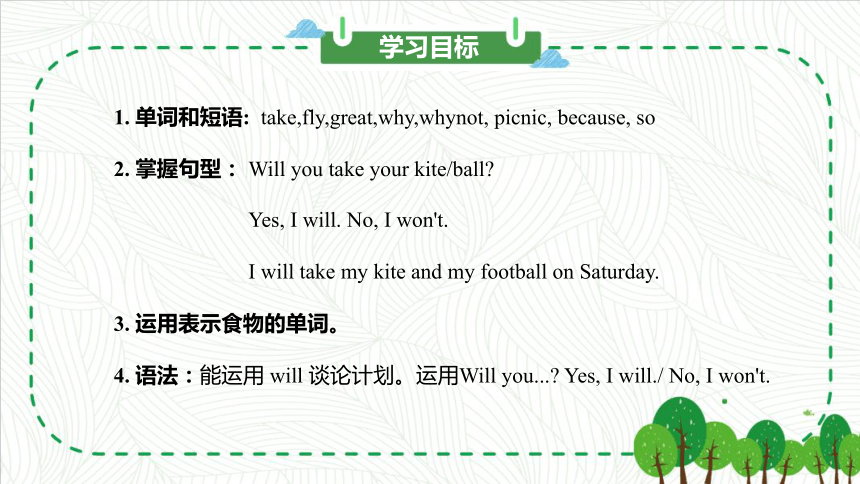
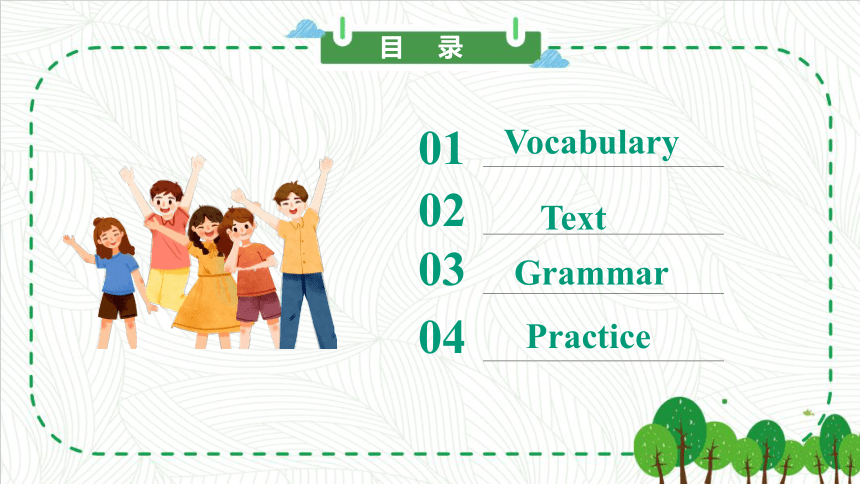
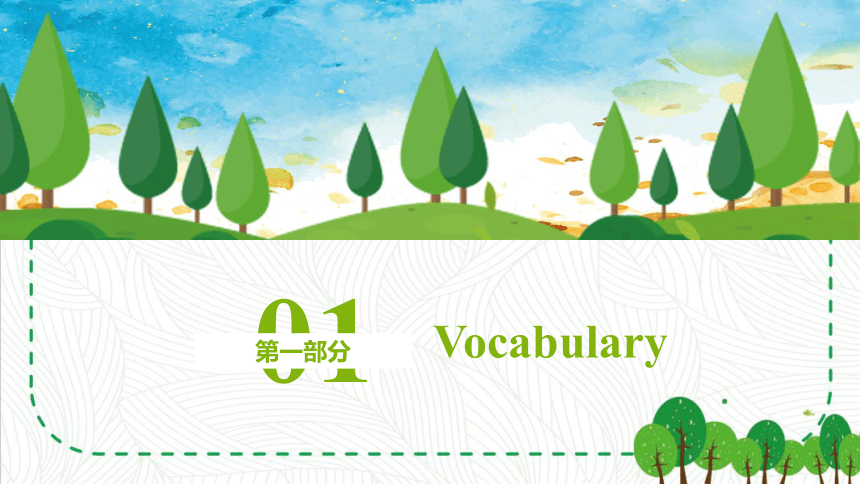
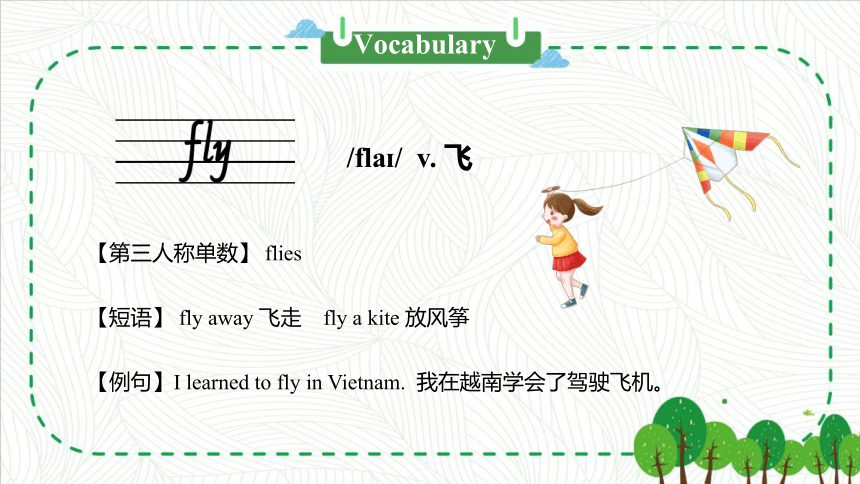
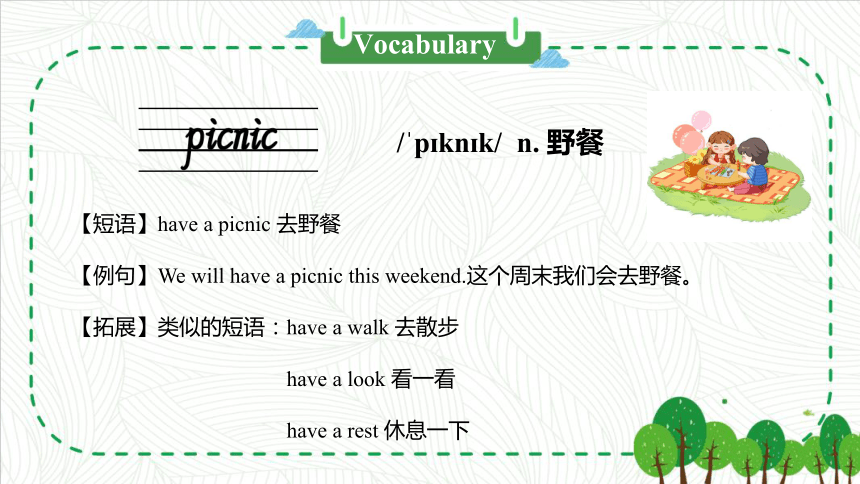

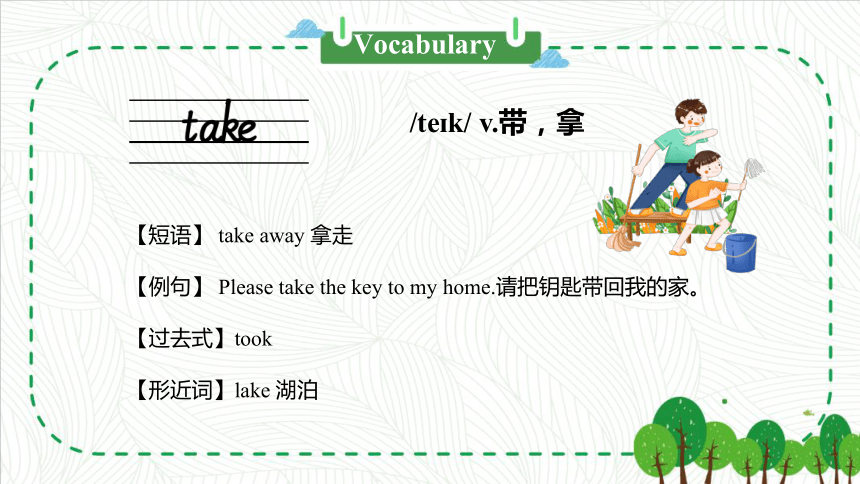
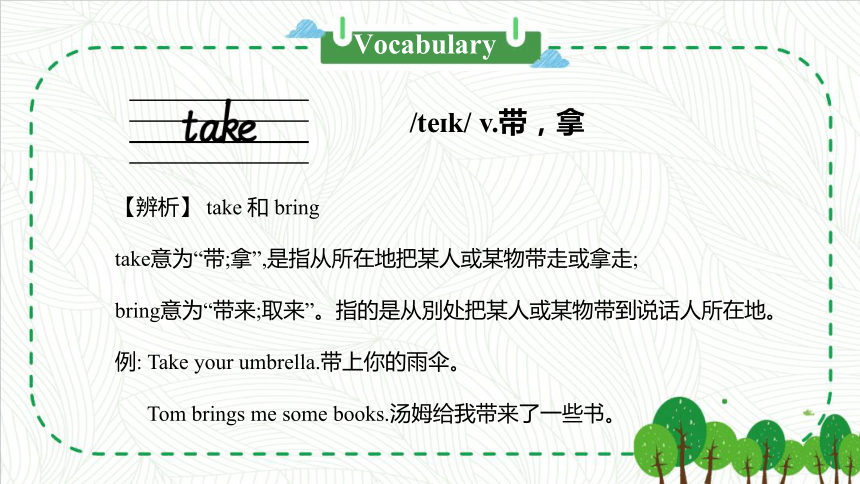
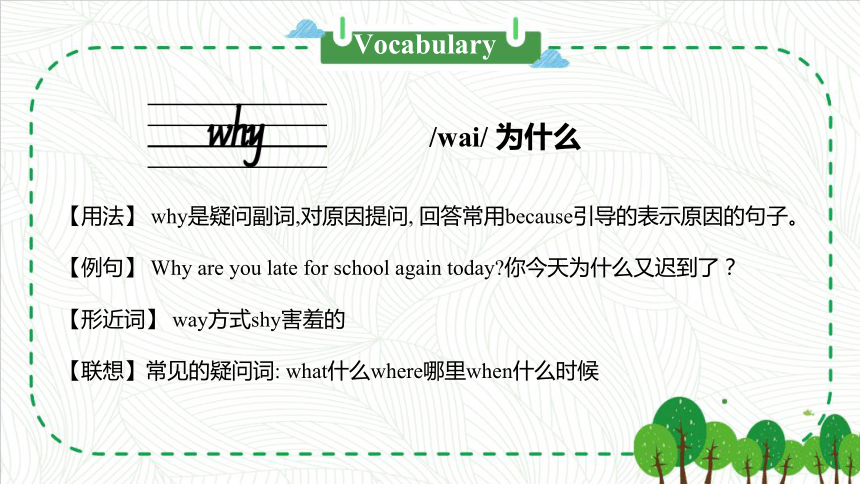

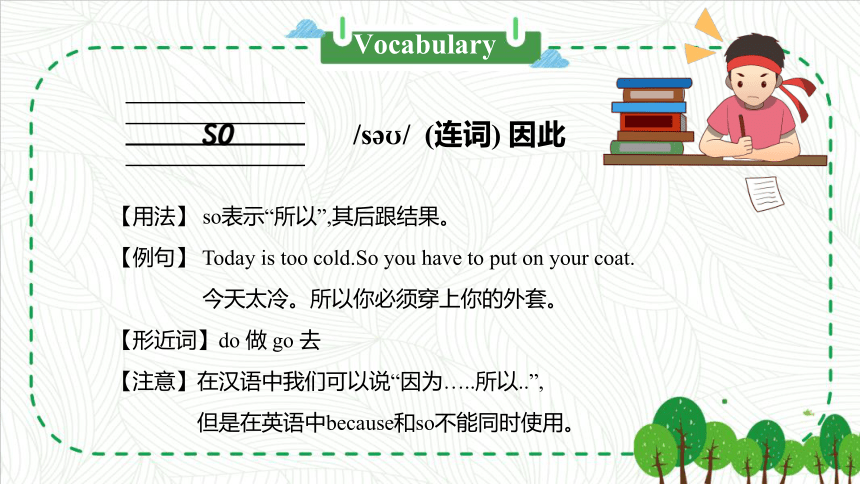
文档简介
(共52张PPT)
Module 4 Unit 1
Will you take your kite
外研版三起 四年级下册
学习目标
1. 单词和短语: take,fly,great,why,whynot, picnic, because, so
2. 掌握句型: Will you take your kite/ball
Yes, I will. No, I won't.
I will take my kite and my football on Saturday.
3. 运用表示食物的单词。
4. 语法:能运用 will 谈论计划。运用Will you... Yes, I will./ No, I won't.
01
02
03
04
Vocabulary
Text
Grammar
Practice
目 录
01
第一部分
Vocabulary
【第三人称单数】 flies
【短语】 fly away 飞走 fly a kite 放风筝
【例句】I learned to fly in Vietnam. 我在越南学会了驾驶飞机。
/fla / v. 飞
Vocabulary
【短语】have a picnic 去野餐
【例句】We will have a picnic this weekend.这个周末我们会去野餐。
【拓展】类似的短语:have a walk 去散步
have a look 看一看
have a rest 休息一下
/ p kn k/ n. 野餐
Vocabulary
【用法】 great表示“太好了,好极了”,修饰名词; great也可以单独使用,其后用感叹号,表示对对方所提意见的赞同或者是对对方的称赞。
【例句】 That's a great picture.那是一张很好的图片。
【近义词】 wonderful
【拓展】 great作形容词还可意为“伟大的”。
【形近词】 grade 年级,分数
/ɡre t/ adj. 好极了,棒极了
Vocabulary
【短语】 take away 拿走
【例句】 Please take the key to my home.请把钥匙带回我的家。
【过去式】took
【形近词】lake 湖泊
/te k/ v.带,拿
Vocabulary
【辨析】 take 和 bring
take意为“带;拿”,是指从所在地把某人或某物带走或拿走;
bring意为“带来;取来”。指的是从別处把某人或某物带到说话人所在地。
例: Take your umbrella.带上你的雨伞。
Tom brings me some books.汤姆给我带来了一些书。
/te k/ v.带,拿
Vocabulary
【用法】 why是疑问副词,对原因提问, 回答常用because引导的表示原因的句子。
【例句】 Why are you late for school again today 你今天为什么又迟到了?
【形近词】 way方式shy害羞的
【联想】常见的疑问词: what什么where哪里when什么时候
/wai/ 为什么
Vocabulary
/b k z; b k z/ (连词) 因为
【单词巧记】 be(是)+cause(引起)-because(因为)
【用法】其后跟句子,用来回答对方提问的原因。
【例句】-Why do you like pandas 你为什么喜欢熊猫?
-Because they are cute.因为它们很可爱。
Vocabulary
【用法】 so表示“所以”,其后跟结果。
【例句】 Today is too cold.So you have to put on your coat.
今天太冷。所以你必须穿上你的外套。
【形近词】do 做 go 去
【注意】在汉语中我们可以说“因为…..所以..”,
但是在英语中because和so不能同时使用。
/s / (连词) 因此
Vocabulary
1) have a picnic 去野餐
2) on Saturday 在周六
3) take my kite and ball带上我的风筝和球
4) take a ball 带一个球
Phrases
02
第二部分
Text
Listen and chant.
我会飞。
我也会飞。
你会飞吗?
不,我不会。
Listen, point and find "Will you... "
星期六我们回去野餐! 棒极了!
Listen, point and find "Will you... "
你明天会带你的风筝吗 不,我不会的。
哦。你明天带你的球去吗 不,我不会的。
Listen, point and find "Will you... "
为什么不?
因为明天是星期五。
哦!我们星期六要去野餐!
Listen, point and find "Will you... "
是的!所以星期六我会带上我的风筝和球。
哈哈......
Listen and say.
星期六你会带你的风筝吗
是的,星期六我会带上我的风筝和足球。
用于表达某人或某物会做或能做某事的句型:
主语+ can+ 动词原形+ 其他。
can为情态动词,意为“能;会”,表示能力。
can没有人称和数的变化,后跟动词原形。
用于表达某人或某物不会/不能做某事的句型:
主语+ can’t (can not)+ 动词原形+ 其他。
Grammar
Practice
A: We're going to have a picnic on Saturday.
B: Will you take a ball
A: Yes, I will. / No, I won't.
用于表达某人或某物将要做某事的句型:
主语+ will + 动词原形+ 其他。
用于表达某人或某物将不会做某事的句型:
主语+ won’t(will not) + 动词原形+ 其他。
Grammar
03
第三部分
Grammar
Phrases
1) one day有一天
2) fly a kite 放风筝
3) ride a bike 骑自行车
4) help children learn 帮助孩子学习
Sentences
1) On Saturday we're going to have a picnic!星期六我们打算去野餐!
2) Will you take your kite tomorrow 你明天会带着你的风筝吗
3) No,I won't.不,我不会。
4) Will you take your ball 你会带着你的球吗
5) Yes,I will./No,I won't.是的,我会。/不,我不会。
6) Why not 为什么不呢?
7) Because tomorrow is Friday.因为明天是星期五。
Sentences
On Saturday we're going to have a picnic!星期六我们打算去野餐!
【解读】此句是表达某人计划做某事的句子。
其中be going to结构是固定搭配,表示“打算做……”或“计划做….”,其后跟动词原形, be动词的形式根据句子主语的变化而变化。这一句型常与表示将来的时间状语连用,如tomorrow,next week,next month等。时间状语可以放在句首也可以放在句末。
例: I will have an English test next week.下星期我将会有一场英语考试。
Sentences
2.—Will you take your kite tomorrow 你明天会带着你的风筝吗?
—No,I won't.不,我不会。
【解读】此句是询问对方是否将要做某事的一般疑问句。其中will是情态动词,其后跟动词原形。对will 引导的一般疑问句的肯定回答是"Yes,主语+will.”,否定回答是“No,主语+won't.”
【举一反三】—Will you have a picnic with me 你会和我去野餐吗
—Yes,I will.是的,我会。
Sentences
—Why not 为什么不呢?-Because tomorrow is Friday.因为明天是星期五。
【解读】 “Why not ”表示"为什么不呢?",用来询问对方为什么不做某事的原因。这是一个省略句,其后跟动词原形。对问原因的句子的回答一般用“Because+句子.”
【举一反三】—Why not go to the concert 为什么不去音乐会呢
—I have to study for the Englishtest.我必须为英语考试做准备。
And they will help children learn.并且它们将会帮助孩子们学习。
help此处作动词,意为 帮助
"help sb.(to)do sth.意为 帮助某人做某事",其中 to 可以省略。
children 是 child 的复数形式。
例: I will help him do his homework.
我将要帮他做他的家庭作业。
Sentences
(一)一般将来时态的定义:
表示将要发生的动作或存在的状态及打算、计划或准备做某事。
(二)一般将来时态的构成:
be(am/is/are)going to do;will/shall do
(三)一般将来时态的标志词:
tomorrow, next day(week,month,year ...), soon, in a few minutes, the day after tomorrow等表示将来时间的单词或短语。
Grammar
be going to + 动词原形
Grammar
肯定句:主语+be 动词+going to+动原+其它 如: They are going to have an English test nextweek.
他们下周有一场英语考试。
否定句:主语+be 动词+not+going to+动原+其它. 如: They aren't going to have an English test next week.
他们下周没有英语考试。
一般疑问句:Be动词+主语+going to +动原+其它? 如: Are they going to have an English test nextweek
他们下周有英语考试吗?
特殊疑问句: 特殊疑问词+ be +主语+going to+动原+其它 如:What are they going to do next week
他们下周将去做什么?
will + 动词原形
Grammar
肯定句:主语+ will + 动原+其它 如: They will go shopping next Friday.
=They'llgo shopping next Friday.他们下周五要去购物。
否定句:主语+will +not+动原+其它. 注意缩写:will not=won't 如:They will not go shopping nextFriday.
=They won't go shopping next Friday.他们下周五不去购物。
一般疑问句:Will+主语+动原+其它? 如: Will they go shopping next Friday 他们下周五要去购物吗?
特殊疑问句: 特殊疑问词+will +主语+动原+其它 如:What will they do tomorrow 他们明天将做什么?
be going to 与 will 两者都可表示将要发生的事、将要去做某事,
但它们有如下几点区别:
①be going to 表示近期、眼下就要发生的事情,will 表示的将来时间则较远一些。
He is going to write a letter tonight.今天晚上他打算写一封信。
He will write a book one day.(将来)有一天,他将写一本书。
Grammar
be going to 与 will 的区别
②be going to 表示根据主观判断将来肯定发生的事情,
will表示客观上将来势必发生的事情。
He is seriously ill.He is going to die.他病的很重,快要死了。
He will be twenty years old.他将二十岁了。
Grammar
be going to 与 will 的区别
③be going to 含有“计划,准备”的意思,而 will则没有这个意思。
She is going to lend us her book.她准备把她的书借给我们。
He will be here in half an hour.他半小时后到这里。
Grammar
be going to 与 will 的区别
04
第四部分
Practice
翻译下列单词或者短语。
1.robot_________ 2. our_________
3.will _________ 4.learn_________
5.everything_________ 6.one day _________
7.housework_________ 8.help_________
9.homework_________ 10.children_________
给方框里面的短语选择正确的译文。
A.做蛋糕 B.做我们的家庭作业 C.帮助孩子们学习
D.做家务 E.做所有事情 F.放风筝
( )1.do everything
( )2.do the housework
( )3.help children learn
( )4.do our homework
( )5.make cakes
( )6.fly a kite.
选择题。
( )1.He can ___ his bike.
A.riding B. ride C. rides
( )2.She ____ fly her kite.
A.can B. is C. Are
( )3.--What’s that --____________.
A.They are robots. B. This is a robot. C. It is a robot.
选择最佳答案填空。
( )4.--___ they do our homework
--.Yes, they will
A.can B. do C. will
( )5.They will ___ cakes.
A.make B. making C. made
根据情景选择正确的答案。
1.当你想告诉别人“你将要做的你作业”你可以说____________.
A.I will do my homework.
B.I can do my home work.
C.I will do my housework.
根据情景选择正确的答案。
2.如果你想告诉他人”机器人将会帮助孩子们学习“,你可以说:________
A.Robot can help children learn.
B.Robot will help children learn.
C. Robot will help children read.
根据情景选择正确的答案。
3.如果你想告诉他人“我会放风筝”,你可以说:________
A.I can fly a kite.
B.You can fly a kite.
C. I will fly a kite.
根据情景选择正确的答案。
4.如果你想告诉他人”机器人将会做所有事情”,你可以说:_____________.
A.Robots can do everything.
B.Robots will do everything.
C.Robots can do something.
翻译下面句子。
1.Robots will make cakes._________________________________
2.Robots will do everything.__________________________________
3.They will do our homework.__________________________________
4.I can do housework.____________________________
根据汉语意思选词填空。
learn Our homework everything robot
1. This __________ (机器人) can talk.
2. __________ (我们的) house is big and beautiful.
3. One day,robots will do __________ (所有事情).
4. I will help these children __________ (学习).
5. Daming does his __________ (家庭作业) in the evening.
用括号里所给单词的正确形式填空。
1. I can ________ (fly) a kite.
2. My mother will ________ (do) the housework.
3. Mr Green has two ________ (child),a son and a daughter.
4. We will take ________ (photo) in the park.
5. I will help Daming ________ (learn) English.
单项选择。
( ) 1. Amy can ________ her bike.
A. ride B. rides C. riding
( ) 2. —What's that —________ a kite.
A. That's B. It's C. This's
( ) 3. Robots will ________ everything.
A. do B. does C. did
( ) 4. They will help the boy ________.
A. learning B. learnt C. learn
( ) 5. —Will they do our homework —No, ________.
A. they will B. they won't C. they can't
为下列图片选择合适的句子。
A. Robots will help children learn.
B. Robots will make cakes.
C. Robots will take photos.
D. Robots will sing songs.
E. Robots will do the housework.
Thank you!
外研版三起 四年级下册
Module 4 Unit 1
Will you take your kite
外研版三起 四年级下册
学习目标
1. 单词和短语: take,fly,great,why,whynot, picnic, because, so
2. 掌握句型: Will you take your kite/ball
Yes, I will. No, I won't.
I will take my kite and my football on Saturday.
3. 运用表示食物的单词。
4. 语法:能运用 will 谈论计划。运用Will you... Yes, I will./ No, I won't.
01
02
03
04
Vocabulary
Text
Grammar
Practice
目 录
01
第一部分
Vocabulary
【第三人称单数】 flies
【短语】 fly away 飞走 fly a kite 放风筝
【例句】I learned to fly in Vietnam. 我在越南学会了驾驶飞机。
/fla / v. 飞
Vocabulary
【短语】have a picnic 去野餐
【例句】We will have a picnic this weekend.这个周末我们会去野餐。
【拓展】类似的短语:have a walk 去散步
have a look 看一看
have a rest 休息一下
/ p kn k/ n. 野餐
Vocabulary
【用法】 great表示“太好了,好极了”,修饰名词; great也可以单独使用,其后用感叹号,表示对对方所提意见的赞同或者是对对方的称赞。
【例句】 That's a great picture.那是一张很好的图片。
【近义词】 wonderful
【拓展】 great作形容词还可意为“伟大的”。
【形近词】 grade 年级,分数
/ɡre t/ adj. 好极了,棒极了
Vocabulary
【短语】 take away 拿走
【例句】 Please take the key to my home.请把钥匙带回我的家。
【过去式】took
【形近词】lake 湖泊
/te k/ v.带,拿
Vocabulary
【辨析】 take 和 bring
take意为“带;拿”,是指从所在地把某人或某物带走或拿走;
bring意为“带来;取来”。指的是从別处把某人或某物带到说话人所在地。
例: Take your umbrella.带上你的雨伞。
Tom brings me some books.汤姆给我带来了一些书。
/te k/ v.带,拿
Vocabulary
【用法】 why是疑问副词,对原因提问, 回答常用because引导的表示原因的句子。
【例句】 Why are you late for school again today 你今天为什么又迟到了?
【形近词】 way方式shy害羞的
【联想】常见的疑问词: what什么where哪里when什么时候
/wai/ 为什么
Vocabulary
/b k z; b k z/ (连词) 因为
【单词巧记】 be(是)+cause(引起)-because(因为)
【用法】其后跟句子,用来回答对方提问的原因。
【例句】-Why do you like pandas 你为什么喜欢熊猫?
-Because they are cute.因为它们很可爱。
Vocabulary
【用法】 so表示“所以”,其后跟结果。
【例句】 Today is too cold.So you have to put on your coat.
今天太冷。所以你必须穿上你的外套。
【形近词】do 做 go 去
【注意】在汉语中我们可以说“因为…..所以..”,
但是在英语中because和so不能同时使用。
/s / (连词) 因此
Vocabulary
1) have a picnic 去野餐
2) on Saturday 在周六
3) take my kite and ball带上我的风筝和球
4) take a ball 带一个球
Phrases
02
第二部分
Text
Listen and chant.
我会飞。
我也会飞。
你会飞吗?
不,我不会。
Listen, point and find "Will you... "
星期六我们回去野餐! 棒极了!
Listen, point and find "Will you... "
你明天会带你的风筝吗 不,我不会的。
哦。你明天带你的球去吗 不,我不会的。
Listen, point and find "Will you... "
为什么不?
因为明天是星期五。
哦!我们星期六要去野餐!
Listen, point and find "Will you... "
是的!所以星期六我会带上我的风筝和球。
哈哈......
Listen and say.
星期六你会带你的风筝吗
是的,星期六我会带上我的风筝和足球。
用于表达某人或某物会做或能做某事的句型:
主语+ can+ 动词原形+ 其他。
can为情态动词,意为“能;会”,表示能力。
can没有人称和数的变化,后跟动词原形。
用于表达某人或某物不会/不能做某事的句型:
主语+ can’t (can not)+ 动词原形+ 其他。
Grammar
Practice
A: We're going to have a picnic on Saturday.
B: Will you take a ball
A: Yes, I will. / No, I won't.
用于表达某人或某物将要做某事的句型:
主语+ will + 动词原形+ 其他。
用于表达某人或某物将不会做某事的句型:
主语+ won’t(will not) + 动词原形+ 其他。
Grammar
03
第三部分
Grammar
Phrases
1) one day有一天
2) fly a kite 放风筝
3) ride a bike 骑自行车
4) help children learn 帮助孩子学习
Sentences
1) On Saturday we're going to have a picnic!星期六我们打算去野餐!
2) Will you take your kite tomorrow 你明天会带着你的风筝吗
3) No,I won't.不,我不会。
4) Will you take your ball 你会带着你的球吗
5) Yes,I will./No,I won't.是的,我会。/不,我不会。
6) Why not 为什么不呢?
7) Because tomorrow is Friday.因为明天是星期五。
Sentences
On Saturday we're going to have a picnic!星期六我们打算去野餐!
【解读】此句是表达某人计划做某事的句子。
其中be going to结构是固定搭配,表示“打算做……”或“计划做….”,其后跟动词原形, be动词的形式根据句子主语的变化而变化。这一句型常与表示将来的时间状语连用,如tomorrow,next week,next month等。时间状语可以放在句首也可以放在句末。
例: I will have an English test next week.下星期我将会有一场英语考试。
Sentences
2.—Will you take your kite tomorrow 你明天会带着你的风筝吗?
—No,I won't.不,我不会。
【解读】此句是询问对方是否将要做某事的一般疑问句。其中will是情态动词,其后跟动词原形。对will 引导的一般疑问句的肯定回答是"Yes,主语+will.”,否定回答是“No,主语+won't.”
【举一反三】—Will you have a picnic with me 你会和我去野餐吗
—Yes,I will.是的,我会。
Sentences
—Why not 为什么不呢?-Because tomorrow is Friday.因为明天是星期五。
【解读】 “Why not ”表示"为什么不呢?",用来询问对方为什么不做某事的原因。这是一个省略句,其后跟动词原形。对问原因的句子的回答一般用“Because+句子.”
【举一反三】—Why not go to the concert 为什么不去音乐会呢
—I have to study for the Englishtest.我必须为英语考试做准备。
And they will help children learn.并且它们将会帮助孩子们学习。
help此处作动词,意为 帮助
"help sb.(to)do sth.意为 帮助某人做某事",其中 to 可以省略。
children 是 child 的复数形式。
例: I will help him do his homework.
我将要帮他做他的家庭作业。
Sentences
(一)一般将来时态的定义:
表示将要发生的动作或存在的状态及打算、计划或准备做某事。
(二)一般将来时态的构成:
be(am/is/are)going to do;will/shall do
(三)一般将来时态的标志词:
tomorrow, next day(week,month,year ...), soon, in a few minutes, the day after tomorrow等表示将来时间的单词或短语。
Grammar
be going to + 动词原形
Grammar
肯定句:主语+be 动词+going to+动原+其它 如: They are going to have an English test nextweek.
他们下周有一场英语考试。
否定句:主语+be 动词+not+going to+动原+其它. 如: They aren't going to have an English test next week.
他们下周没有英语考试。
一般疑问句:Be动词+主语+going to +动原+其它? 如: Are they going to have an English test nextweek
他们下周有英语考试吗?
特殊疑问句: 特殊疑问词+ be +主语+going to+动原+其它 如:What are they going to do next week
他们下周将去做什么?
will + 动词原形
Grammar
肯定句:主语+ will + 动原+其它 如: They will go shopping next Friday.
=They'llgo shopping next Friday.他们下周五要去购物。
否定句:主语+will +not+动原+其它. 注意缩写:will not=won't 如:They will not go shopping nextFriday.
=They won't go shopping next Friday.他们下周五不去购物。
一般疑问句:Will+主语+动原+其它? 如: Will they go shopping next Friday 他们下周五要去购物吗?
特殊疑问句: 特殊疑问词+will +主语+动原+其它 如:What will they do tomorrow 他们明天将做什么?
be going to 与 will 两者都可表示将要发生的事、将要去做某事,
但它们有如下几点区别:
①be going to 表示近期、眼下就要发生的事情,will 表示的将来时间则较远一些。
He is going to write a letter tonight.今天晚上他打算写一封信。
He will write a book one day.(将来)有一天,他将写一本书。
Grammar
be going to 与 will 的区别
②be going to 表示根据主观判断将来肯定发生的事情,
will表示客观上将来势必发生的事情。
He is seriously ill.He is going to die.他病的很重,快要死了。
He will be twenty years old.他将二十岁了。
Grammar
be going to 与 will 的区别
③be going to 含有“计划,准备”的意思,而 will则没有这个意思。
She is going to lend us her book.她准备把她的书借给我们。
He will be here in half an hour.他半小时后到这里。
Grammar
be going to 与 will 的区别
04
第四部分
Practice
翻译下列单词或者短语。
1.robot_________ 2. our_________
3.will _________ 4.learn_________
5.everything_________ 6.one day _________
7.housework_________ 8.help_________
9.homework_________ 10.children_________
给方框里面的短语选择正确的译文。
A.做蛋糕 B.做我们的家庭作业 C.帮助孩子们学习
D.做家务 E.做所有事情 F.放风筝
( )1.do everything
( )2.do the housework
( )3.help children learn
( )4.do our homework
( )5.make cakes
( )6.fly a kite.
选择题。
( )1.He can ___ his bike.
A.riding B. ride C. rides
( )2.She ____ fly her kite.
A.can B. is C. Are
( )3.--What’s that --____________.
A.They are robots. B. This is a robot. C. It is a robot.
选择最佳答案填空。
( )4.--___ they do our homework
--.Yes, they will
A.can B. do C. will
( )5.They will ___ cakes.
A.make B. making C. made
根据情景选择正确的答案。
1.当你想告诉别人“你将要做的你作业”你可以说____________.
A.I will do my homework.
B.I can do my home work.
C.I will do my housework.
根据情景选择正确的答案。
2.如果你想告诉他人”机器人将会帮助孩子们学习“,你可以说:________
A.Robot can help children learn.
B.Robot will help children learn.
C. Robot will help children read.
根据情景选择正确的答案。
3.如果你想告诉他人“我会放风筝”,你可以说:________
A.I can fly a kite.
B.You can fly a kite.
C. I will fly a kite.
根据情景选择正确的答案。
4.如果你想告诉他人”机器人将会做所有事情”,你可以说:_____________.
A.Robots can do everything.
B.Robots will do everything.
C.Robots can do something.
翻译下面句子。
1.Robots will make cakes._________________________________
2.Robots will do everything.__________________________________
3.They will do our homework.__________________________________
4.I can do housework.____________________________
根据汉语意思选词填空。
learn Our homework everything robot
1. This __________ (机器人) can talk.
2. __________ (我们的) house is big and beautiful.
3. One day,robots will do __________ (所有事情).
4. I will help these children __________ (学习).
5. Daming does his __________ (家庭作业) in the evening.
用括号里所给单词的正确形式填空。
1. I can ________ (fly) a kite.
2. My mother will ________ (do) the housework.
3. Mr Green has two ________ (child),a son and a daughter.
4. We will take ________ (photo) in the park.
5. I will help Daming ________ (learn) English.
单项选择。
( ) 1. Amy can ________ her bike.
A. ride B. rides C. riding
( ) 2. —What's that —________ a kite.
A. That's B. It's C. This's
( ) 3. Robots will ________ everything.
A. do B. does C. did
( ) 4. They will help the boy ________.
A. learning B. learnt C. learn
( ) 5. —Will they do our homework —No, ________.
A. they will B. they won't C. they can't
为下列图片选择合适的句子。
A. Robots will help children learn.
B. Robots will make cakes.
C. Robots will take photos.
D. Robots will sing songs.
E. Robots will do the housework.
Thank you!
外研版三起 四年级下册
同课章节目录
- Module 1
- Unit 1 She's a nice teache
- Unit 2 He's cool.
- Module 2
- Unit 1 London is a big city.
- Unit 2 It's very old.
- Module 3
- Unit 1 Robots will do everything.
- Unit 2 On Monday I'll go swimming.
- Module 4
- Unit 1 Will you take your kite?
- Unit 2 Will it be hot in Haikou?
- Module 5
- Unit 1 I was two then.
- Unit 2 They were young.
- Module 6
- Unit 1 Were you at home yesterday?
- Unit 2 Was it a big city then ?
- Module 7
- Unit 1 I helped Mum.
- Unit 2 Grandma cooked fish.
- Module 8
- Unit 1 They sang beautifully.
- Unit 2 I took some pictures.
- Module 9
- Unit 1 Did he live in New York ?
- Unit 2 Did you have a nice holiday?
- Review Module
- Unit 1
- Unit 2
- Module 10
- Unit 1 Did you fall off your bike?
- Unit 2 Sam had lots of chocolate.
